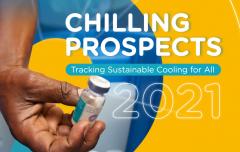Creating a greener, cooler and healthier Medellín
On World Environment Day, the UN Decade on Ecosystem Restoration will be launched. It's a global push to revive natural spaces lost to development – an effort that the city of Medellín already started several years ago.
After enduring years of high crime and violence, the Colombian city of Medellín faces a new threat – rising urban temperatures, driven by climate change. The city and its businesses are turning to new sustainable cooling solutions, both indoors and outdoors, to protect their citizens and workers.
Green Corridors programme
The City of Medellín responded to the challenge of rising urban heat by bringing people together and planting vegetation along busy streets and former waterways to create a better environment for everyone, while at the same time reducing city temperatures. The Green Corridors project provides shade for cyclists and pedestrians, cools built-up areas and cleans the air along busy roads. As a result of the project, almost 880,000 trees and 2.5 million smaller plants have sprung up around the city. As part of the initiative, Medellín’s botanical gardens train people from disadvantaged backgrounds to become city gardeners and planting technicians.
"The programme came from the need to connect people to nature – recovering spaces that were occupied by concrete."
Secretary of Environment Sergio Orozco
The programme has achieved significant heat reductions. From 2016 to 2019 average air temperatures in the city’s Green Corridors locations fell from 31.6C to 27.1C, and average surface temperatures dropped by over 10 degrees, from 40.5C to 30.2°C.
The programme also brought training and employment opportunities. From 2016 to 2019, 107 people from disadvantaged communities were trained as gardeners, and 2,600 workers were employed through the project.
Just as impressive are the numerous other benefits of the programme – including improvements in air quality. In the same three-year period, levels of the particulate pollutant PM 2.5 fell from 21.81 µg/m3 to 20.26 µg/m3, and levels of PM 10 from 46.04 µg/m3 to 40.4 µg/m3. Ozone levels dropped from 30.1 µg/m3 to 26.32 µg/m3. This brought huge health benefits. From 2016 to 2019, the city’s morbidity rate from acute respiratory infections fell from 159.8 per thousand inhabitants to 95.3. Cycling rose by 34.6 percent, and walking by 4 percent. The surge in cycling was aided by the construction of 80 km of new bike paths as part of the project.
Every aspect of the programme – from lower temperatures and better health to training opportunities – has driven progress towards a fairer, more equal city. It has created 1.5 million m2 of public space for people of all ages and from diverse economic backgrounds to enjoy together.




